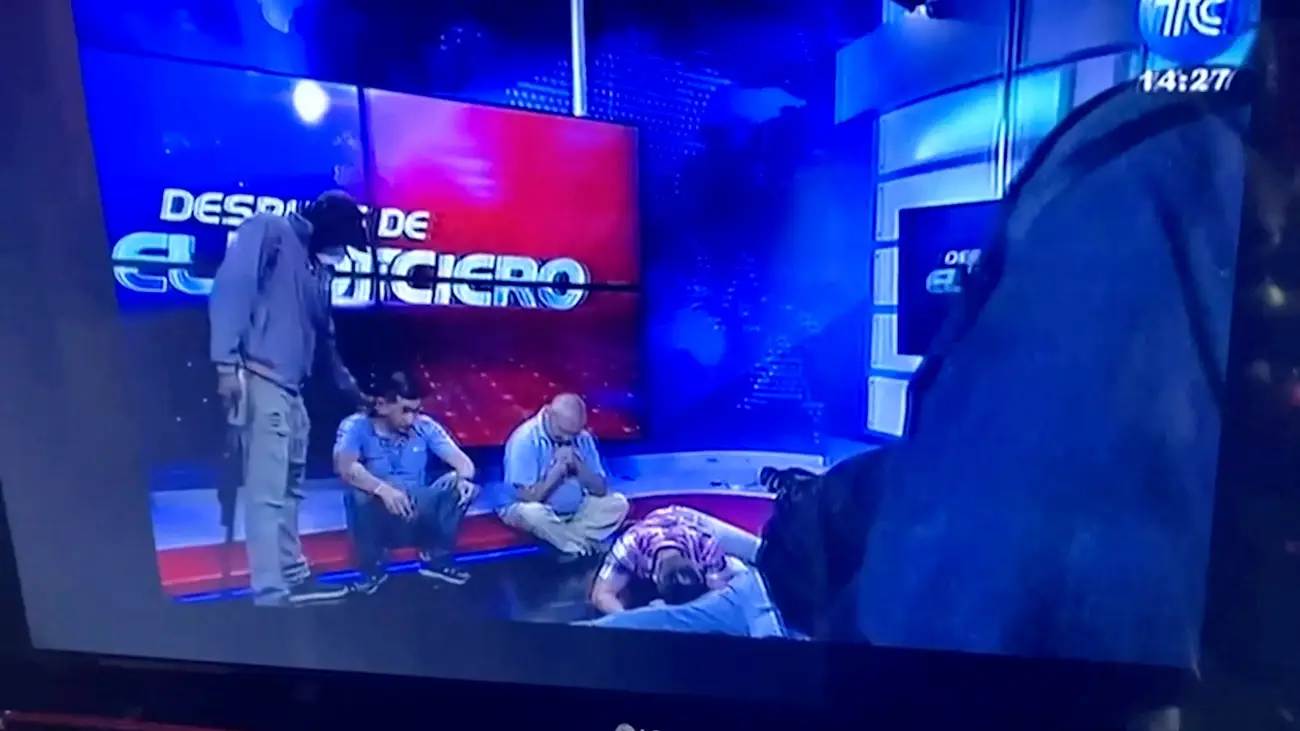In a bold move to combat the growing menace of drug-related violence, the government of Ecuador has declared drug gangs as terrorist organizations. This decision comes after a live TV attack by armed gunmen, who stormed a TV studio and threatened staff, causing a wave of violence in the country.
The Ecuadorian government has been facing increasing pressure to address the issue of drug-related violence, which has been on the rise in recent years. The country has seen a spike in the number of drug-related homicides, kidnappings, and other forms of violence. The situation has become so dire that the government has declared a state of emergency in several provinces.
The live TV attack, which took place last week, was a turning point for the government. The gunmen, who were believed to be affiliated with drug gangs, stormed the TV studio during a live broadcast, threatening the staff and causing panic. The attack was widely condemned by the public and the media, and it prompted the government to take action.
In a statement, the Ecuadorian President, Lenin Moreno, said, “We will not tolerate such acts of terrorism and violence. We will do everything in our power to bring those responsible to justice and to protect our citizens.”
The government has now launched a crackdown on drug gangs, with the military and police conducting raids and arrests across the country. The authorities have also increased security measures in public places, such as schools, hospitals, and transportation hubs.
The declaration of drug gangs as terrorist organizations is a significant development, as it allows the government to use anti-terrorism laws to prosecute those involved in drug-related violence. The government has also announced plans to increase funding for law enforcement agencies and to improve intelligence gathering and sharing.
The move has been welcomed by many Ecuadorians, who have been living in fear of drug-related violence. “This is a long-overdue move by the government,” said Maria Rodriguez, a resident of Quito. “We have been living in fear for too long, and it’s time for the government to take action.”
However, some critics have raised concerns about the potential human rights implications of the crackdown. “We need to ensure that the government’s actions are in line with human rights standards,” said Juan Carlos, a human rights lawyer. “We do not want to see innocent people being targeted or mistreated in the name of fighting drug-related violence.”
The Ecuadorian government has assured that it will respect human rights and due process in its crackdown on drug gangs.
What is the history of drug gangs in Ecuador?
Ecuador has a long history of drug trafficking and gang activity, dating back to the 1980s when the country became a major transshipment point for cocaine from Colombia. At that time, Ecuadorian organized crime groups, such as the “rultas” (street gangs) and the “carteles” (drug trafficking organizations), began to emerge and establish themselves in the drug trade.
During the 1990s and early 2000s, Ecuadorian drug traffickers formed alliances with Colombian cartels, such as the Medellín and Cali cartels, and began to transport cocaine to the United States and Europe. These alliances allowed Ecuadorian gangs to gain access to larger quantities of drugs and to expand their operations.
In the mid-2000s, the Ecuadorian government launched a series of anti-drug campaigns, which led to the dismantling of some of the major drug trafficking organizations. However, this only led to the emergence of new gangs and the evolution of existing ones.
In recent years, Ecuador has seen the rise of new and more powerful drug gangs, such as the “Los Lobos” and the “Los Choneros,” which have become involved in other criminal activities, such as extortion, kidnapping, and murder. These gangs have also become more violent and have been known to use tactics such as torture and murder to maintain control over their territories and to eliminate their rivals.
In addition, Ecuador has also seen the emergence of new drug trafficking routes, such as the “Pacific Route,” which runs through the Pacific coast of Ecuador and has become a major transshipment point for cocaine destined for the United States and other countries.
The Ecuadorian government has continued to struggle to control the drug trade and gang activity, and the country remains a major hub for drug trafficking in South America. The government has implemented various anti-drug programs and has worked with international law enforcement agencies to dismantle drug trafficking organizations, but the problem remains a major challenge.
Overall, the history of drug gangs in Ecuador is complex and has evolved over time, with new gangs and routes emerging as the country’s role in the drug trade has grown. The problem of drug trafficking and gang activity continues to be a major challenge for the Ecuadorian government and law enforcement agencies, and it is likely that the issue will continue to be a major concern for the country in the future.
What is the government doing to help victims of drug-related violence?
The government of Ecuador has taken various measures to help victims of drug-related violence, including:
1. Creation of the National Observatory of Drugs and Organized Crime: This institution was established in 2018 to monitor and analyze the situation of drug trafficking and organized crime in the country, and to provide technical assistance to victims of these crimes.
2. Victims’ Assistance Program: The government has implemented a program to provide assistance to victims of drug-related violence, including psychological support, legal aid, and financial assistance.
3. Reparation Law: In 2019, the government passed a law that establishes the right of victims of drug-related violence to reparation, including compensation for damages and restitution.
4. Support for Community-Based Programs: The government has provided support to community-based programs that work with victims of drug-related violence, including programs that provide psychological support, education, and job training.
5. Increased Funding for Law Enforcement: The government has increased funding for law enforcement agencies to combat drug trafficking and organized crime, which has led to the dismantling of some drug trafficking organizations and the arrest of their leaders.
6. International Cooperation: The government has strengthened its cooperation with other countries to combat drug trafficking and organized crime, including through the sharing of intelligence and the extradition of fugitives.
7. Public Awareness Campaigns: The government has launched public awareness campaigns to educate the public about the dangers of drug use and the importance of reporting any suspicious activity to the authorities.
8. Support for Drug Addiction Treatment: The government has provided support for drug addiction treatment programs, including the establishment of rehabilitation centers and the provision of free treatment for those who cannot afford it.
9. Community Engagement: The government has engaged with community leaders and organizations to raise awareness about the issue of drug-related violence and to involve the community in the fight against drug trafficking.
10. Human Rights Training: The government has provided human rights training for law enforcement officials to ensure that they respect the rights of victims and do not engage in human rights abuses.
Overall, the government of Ecuador has taken a comprehensive approach to addressing the issue of drug-related violence, including providing support to victims and strengthening law enforcement efforts. However, the problem remains a major challenge, and the government continues to work to address it.
What is the impact of drug trafficking on local communities in Ecuador?
Drug trafficking has had a devastating impact on local communities in Ecuador, leading to increased violence, kidnappings, and instability. It has also strained the country’s prison system and has contributed to the rise of gang violence. Additionally, it has had a negative impact on the country’s economy and has led to a breakdown in trust between law enforcement and the communities they serve.






I don’t think the title of your article matches the content lol. Just kidding, mainly because I had some doubts after reading the article.